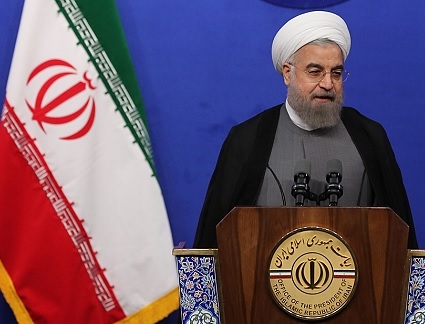Iran has filed a complaint with the International Court of Justice to reclaim some $2 billion in assets frozen in the United States, President Hassan Rouhani announced on June 15. Tehran’s move is a response to an April 2016 ruling by the U.S. Supreme Court that held Iran financially responsible for terrorist attacks dating back to the 1983 Marine Corps barracks bombing in Beirut. The court ordered that the frozen assets be made available to compensate more than 1,000 victims of terrorist acts linked to Iran, such as the 1996 Khobar Towers bombing in Saudi Arabia.
 Rouhani discussed the complaint, filed the previous day, at a gathering to break the Ramadan fast. He described the U.S. courts’ decisions as “illegal” and vowed to recover Iran’s assets along with compensation. The assets in question include some $1.75 billion in bonds, plus accumulating interest, held by Citibank in New York. They were part of the central bank’s foreign currency reserves. In April, Foreign Minister Mohammad Javad Zarif said the court ruling was “highway robbery” in an interview with The New Yorker.
Rouhani discussed the complaint, filed the previous day, at a gathering to break the Ramadan fast. He described the U.S. courts’ decisions as “illegal” and vowed to recover Iran’s assets along with compensation. The assets in question include some $1.75 billion in bonds, plus accumulating interest, held by Citibank in New York. They were part of the central bank’s foreign currency reserves. In April, Foreign Minister Mohammad Javad Zarif said the court ruling was “highway robbery” in an interview with The New Yorker.The following are excerpted remarks by Rouhani and a portion of the International Court of Justice press release.
President Hassan Rouhani
“The government will follow the case until the nation's rights are realized and the money is back, along with its compensation.”
“American courts have issued illegal verdicts and claimed that these assets should be allocated to the Americans and the families of those who were killed in Lebanon; it is not clear what Americans were doing in Lebanon and how does this issue concern Iran.”
Iran has filed complaint with #ICJ against US for the seizure of $2B of its assets. We'll pursue until all assets and damages are recovered.
— Hassan Rouhani (@HassanRouhani) June 15, 2016
—June 15, 2016, at an iftar event
International Court of Justice
Iran institutes proceedings against the United States with regard to a dispute concerning alleged violations of the 1955 Treaty of Amity
THE HAGUE, 15 June 2016. The Islamic Republic of Iran (hereinafter “Iran”) instituted proceedings yesterday against the United States of America (hereinafter “the United States”) before the International Court of Justice (ICJ), the principal judicial organ of the United Nations, with regard to a dispute concerning “violations by the Government of the United States of America of the Treaty of Amity, Economic Relations, and Consular Rights between Iran and the United States of America which was signed in Tehran on 15 August 1955 and entered into force on 16 June 1957” (hereinafter “the 1955 Treaty”).
The Applicant explains that the United States, having for many years taken “the position that Iran may be designated a State sponsoring terrorism (a designation which Iran strongly contests)”, has adopted a number of legislative and executive acts 1 that have the practical effect of subjecting the assets and interests of Iran and Iranian entities, including those of the Central Bank of Iran (also known as “Bank Markazi”), to enforcement proceedings in the United States, even where such assets or interests “are found to be held by separate juridical entities . . . that are not party to the judgment on liability in respect of which enforcement is sought” and/or “are held by Iran or Iranian entities . . . and benefit from immunities from enforcement proceedings as a matter of international law, and as required by the [1955] Treaty”.
Iran further argues that, as a consequence of these acts, “a wide series of claims have been determined, or are underway, against Iran and Iranian entities” and that United States courts “have repeatedly dismissed attempts by Bank Markazi to rely on the immunities to which such property is entitled” under United States law and the 1955 Treaty. It further maintains that “the assets of Iranian financial institutions and other Iranian companies have already been seized, or are in the process of being seized and transferred, or at risk of being seized and transferred, in a number of proceedings” and explains that, as of the date of its Application, United States courts “ha[ve] awarded total damages of over US$ 56 billion . . . against Iran in respect of its alleged involvement in various terrorist acts mainly outside the USA”.
The Applicant claims that the above-mentioned enactments and decisions “breach a number of provisions of the [1955] Treaty”.
Click here for the full text.
Click here for more information on the U.S. Supreme Court ruling.
